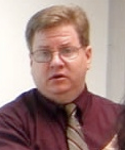 Fostering Parallel Thinking in Computational Science Preparing for Petascale and Beyond
Fostering Parallel Thinking in Computational Science Preparing for Petascale and BeyondRobert Panoff - The Shodor Education Foundation, USA
Session chair: To be announced
Abstract : High Performance Computing continues to substantially reduce the “time to science” while improving the quality of the science itself. Nearly every exploration in the social, life, and physical sciences requires the efficient implementation of complex models of increasing size and scale along with the application of massively parallel computing and the analysis of big data. With performance of compilers not yet close to automatic, the question arises as to how much human intervention for various parallel paradigms is required to achieve substantial machine speed-ups for various parallel architectures.This talk will discuss the challenges in preparing a new generation of computational scientists who are faced with a heterogenous set of multi-core/many-core environments. The goal is to spark a discussion of how we can focus on parallel thinking in scientific problem formulation and solution from the outset, thereby exploiting the parallelism in nature to illuminate the nature of parallelism.
http://www.shodor.org/about/board/panoff/